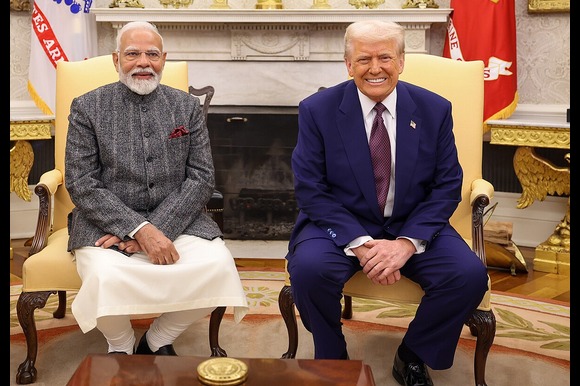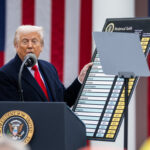President Donald Trump has announced that the United States will impose 25% tariffs on goods imported from India starting 1 August, along with an additional unspecified penalty in response to India’s continued purchases of Russian oil and military equipment.
In a post on his Truth Social platform, Trump said the measures would go into effect on the same day as the US-imposed deadline for a new trade deal with India. He described India as a friend, but criticised what he called “excessively high tariffs” — among the highest in the world — as well as India’s ongoing trade and defence ties with Russia, noting that “everyone wants Russia to STOP THE KILLING IN UKRAINE.”
India’s government responded by stating its commitment to finalising “a fair, balanced and mutually beneficial bilateral trade agreement” with the United States. Last year, the US ran a trade deficit of $45.8 billion (£26.1 billion) with India.
Back in April, Trump had announced a proposal to impose tariffs of up to 27% on Indian imports, but those measures were temporarily put on hold. The upcoming Friday deadline marks the latest point by which India and several other countries must finalise trade agreements with Washington or face increased tariffs.
Tariffs are import taxes levied on foreign goods, often used as leverage in trade negotiations. Trump has repeatedly targeted India’s high import duties in recent years, labelling the country a “tariff king” and accusing it of unfair trade practices.
“But now I’m in charge, and you just can’t do that,” Trump said during a press conference on Tuesday.
India’s government said it is carefully assessing the potential impact of Trump’s latest statement. In an official release, it added that it “attaches the utmost importance to protecting and promoting the welfare” of Indian farmers, entrepreneurs, and small businesses, and that “the government will take all steps necessary to secure our national interest.”
Since April, negotiators from both countries have been attempting to resolve long-standing trade issues, with officials alternating between cautious optimism and more guarded positions.
US Trade Representative Jamieson Greer confirmed that talks were ongoing, saying, “We continue to speak with our Indian counterparts. We’ve always had very constructive discussions with them.” However, Greer also noted that while a trade deal had earlier seemed “imminent,” the US must recognise that India has long maintained a “protectionist” trade policy designed to safeguard its domestic market.
President Trump, Greer added, remains focused on trade deals that provide significantly greater access for American exports.
Among the most contentious areas in negotiations have been agriculture and dairy products. The US has been lobbying for more access to India’s vast farm market for years, viewing it as a largely untapped opportunity. India, however, has staunchly defended its agricultural sector, citing food security concerns and the livelihoods of millions of small farmers.
Last week, India’s Commerce Minister Piyush Goyal told CNBC that agriculture remains a “sensitive” sector and reiterated that the government is committed to ensuring that farmers’ interests are “well protected.”
Goyal also told news agencies that India remains “optimistic” about reaching a deal with the US soon. Speaking to Reuters, he said that the two sides were making “fantastic progress” and expressed hope of finalising a “very consequential partnership.”
Until recently, the United States was India’s largest trading partner. Bilateral trade between the two nations reached $190 billion in 2024. Trump and Indian Prime Minister Narendra Modi have previously stated their ambition to more than double this figure, setting a target of $500 billion.
India has already taken steps to ease some trade tensions by reducing tariffs on several US goods, including Bourbon whiskey and motorcycles. Despite these efforts, the US continues to face a trade imbalance with India, which Trump is determined to address as part of his broader strategy to prioritise American economic interests.






